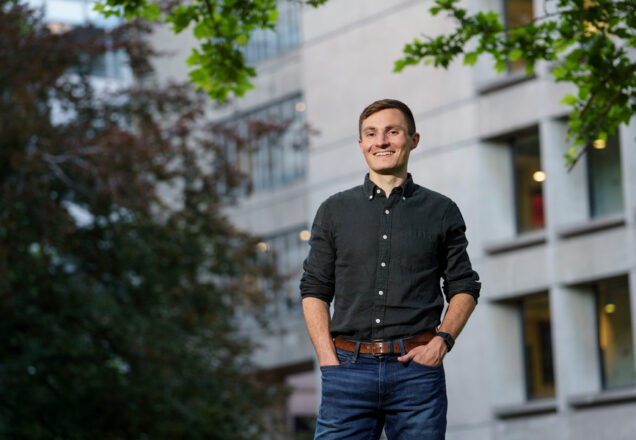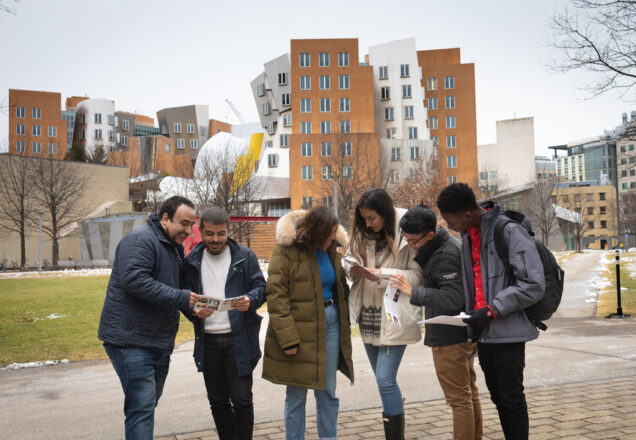Graduate Study at SHASS
World-class graduate studies
SHASS offers five doctoral and five master’s programs.
Doctoral programs
Economics
Our top-ranked PhD program sets the standard for graduate economics training across the country. Graduate students work closely with our world-class faculty to develop their own research and prepare to make impactful contributions to the field.
Our doctoral program enrolls 20-24 full-time students each year and students complete their degree in five to six years. Students undertake core coursework in microeconomic theory, macroeconomics, and econometrics, and are expected to complete two major and two minor fields in economics. Beyond the classroom, doctoral students work in close collaboration with faculty to develop their research capabilities, gaining hands-on experience in both theoretical and empirical projects.
History, Anthropology, and STS (HASTS)
The doctoral program in History, Anthropology, and Science, Technology, and Society (HASTS) at MIT, founded in 1988, is a unique interdisciplinary academic community devoted to studying the social, cultural, and political life of science and technology. HASTS faculty work with students to develop original scholarship on the historical foundations and contemporary implications of scientific and technological knowledge and practice.
As a culmination of their work, HASTS students complete dissertations that intervene in scholarly and public conversations about the role of science in society. After graduation, students go on to careers in academia, public service, and private industry.
Linguistics
Our 5-year PhD program is designed to introduce students to the basic concepts and results of research in generative linguistics, so that they can begin productively contributing to the department’s research activities. We have found that the best way to achieve this goal is for students to work from the very beginning on problems that are relevant to real-life research.
The program is rigorous and quite demanding of students’ time and energy. A high level of commitment and concentration is required to complete it successfully. The program also contains a relatively large number of required courses. We have found that this extra effort pays off in the long run, since students are exposed to a richer mix of research topics and methods. This also means that our students attain a high level of competence in more than one area, and thus qualify for academic and other positions in more than one specialty.

From scallop fishing in New Bedford to deforestation in the tropics, “our goal is to get some empirical traction on the problem,” says Economics PhD student Aaron Berman.
Philosophy
Our program provides subjects and seminars in such traditional areas as logic, ethics, metaphysics, epistemology, philosophy of science, philosophy of language, philosophy of mind, aesthetics, social and political philosophy, and history of philosophy. Interest in philosophical problems arising from other disciplines, such as linguistics, psychology, mathematics and physics, is also encouraged.
Before beginning dissertation research, students are required to take two years of coursework, including a proseminar in contemporary philosophy that all students must complete in their first year of graduate study. Students are also required to write a fifth term pre-dissertation paper and demonstrate competence in the following areas: value theory, logic and the history of philosophy.
Political Science
Our doctoral students are advancing political science as a discipline. They explore the empirical phenomena that produce new scholarly insights—insights that improve the way governments and societies function. As a result, MIT Political Science graduates are sought after for top teaching and research positions in the U.S. and abroad.
The MIT PhD in Political Science requires preparation in two of these major fields: American Politics, Comparative Politics, International Relations, Models and Methods, Political Economy, or Security Studies. We recommend that you take a broad array of courses across your two major fields.

Philosophy doctoral student Abe Mathew is both studying philosophy and questioning some of its deeply-held ideas.
Master’s programs
Data, Economics, and Design of Policy
The international fight against poverty is more data driven than ever before. Producing and understanding rigorous evidence has become increasingly critical for those seeking to affect change globally, but opportunities to acquire these skills remain limited.
As the first master’s program to be offered by MIT’s Department of Economics, the master’s program in Data, Economics, and Design of Policy (DEDP) is designed to meet this rising demand. Jointly run by the Economics Department and the Abdul Latif Jameel Poverty Action Lab (J-PAL), the program equips development professionals from across the globe with the practical skills and theoretical knowledge needed to tackle some of the world’s most pressing challenges.
Explore Data, Economics, and Design of Policy
MIT Indigenous Language Initiative (Linguistics)
The MIT Indigenous Languages Initiative is a special master’s program in linguistics for members of communities whose languages are threatened. The goal of the program is to provide its graduates with the linguistic knowledge that will help them in efforts to keep their communities’ languages alive.
In addition, the MIT Indigenous Language Initiative offers expanded opportunities for students and faculty to become involved in indigenous and endangered languages. They do this through working with native speaker linguists in the master’s program and also with outside groups.
Explore Indigenous Language Initiative
Music Technology and Computation
Music technology is a broad field of study with many applications in industry, academia, and the arts. At MIT, our focus is technical research in music technology that always centers the humanistic and artistic aspects of making music. As such, our program is truly multidisciplinary, with faculty, labs, and curricula coming from the Music and Theater Arts Section (MTA) in the School of Humanities, Arts, and Social Sciences (SHASS), and the School of Engineering (SoE).
We define Music Technology as the field of scientific inquiry where practitioners study, discover, and develop new computational approaches to music that include music information retrieval; artificial intelligence; machine learning; generative algorithms; interaction and performance systems; digital instrument design; conceptual and perceptual modeling of music; acoustics; audio signal processing; and software development for creative expression and music applications.
Explore Music Technology and Computation
Political Science
The MIT Political Science master’s program prepares students to uncover essential insights into the workings of societies and governments in the 21st century. Master’s students develop the skills and knowledge to evaluate and promote effective public policies.
The one-year MIT Master of Science in Political Science is designed for students who want to build proficiency in applied research so that they can pursue successful careers in government, business, and public policy. Students interested in an academic career should read more about the PhD in Political Science.
Science Writing
The MIT Graduate Program in Science Writing (GPSW) is one of the world’s premier master’s programs in science journalism and communication. Set within a community of world-renowned scientists, cutting-edge facilities, and groundbreaking research, our one-year program focuses on introducing students to science communication across a broad range of media, including news and feature reporting, podcasting, data journalism, and documentary film.
During their year here, students learn fundamental research and reporting skills and produce publishable works of print, audio, video, and interactive journalism. Our curriculum teaches students how to interpret and explain science to the wider public, to place research and researchers within their social and historical contexts, and to create pieces that balance hard analysis with creativity and style.

MIT’s Master of Applied Science in Data, Economics, and Design of Policy program adds a public policy track.
More resources
Learn more about MIT graduate studies at the Office of Graduate Education.
